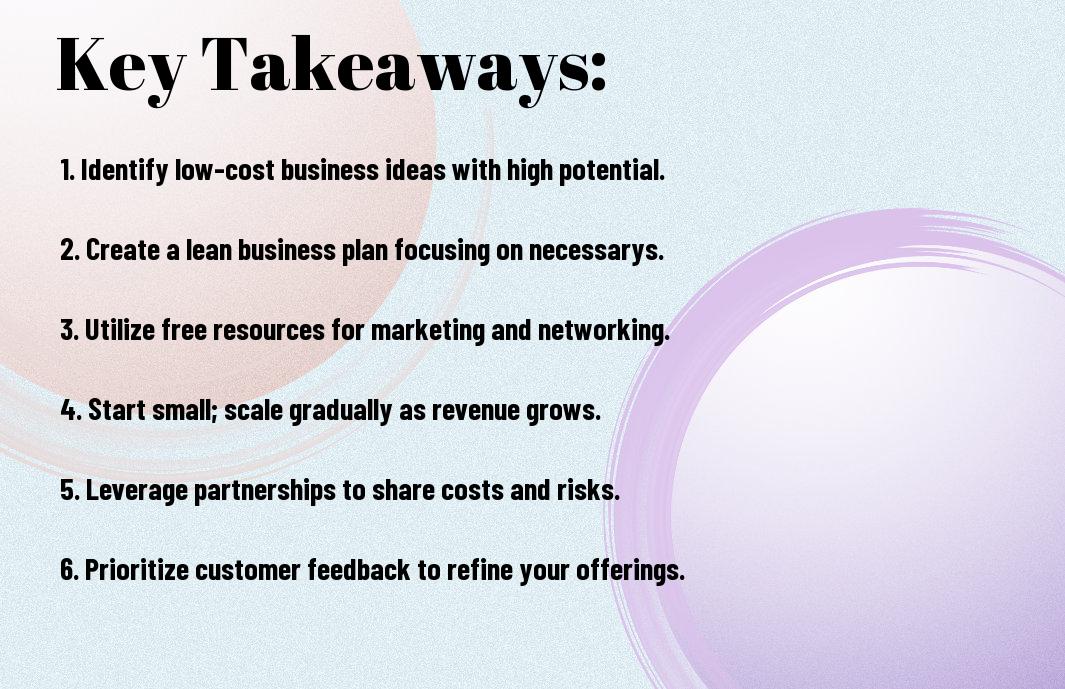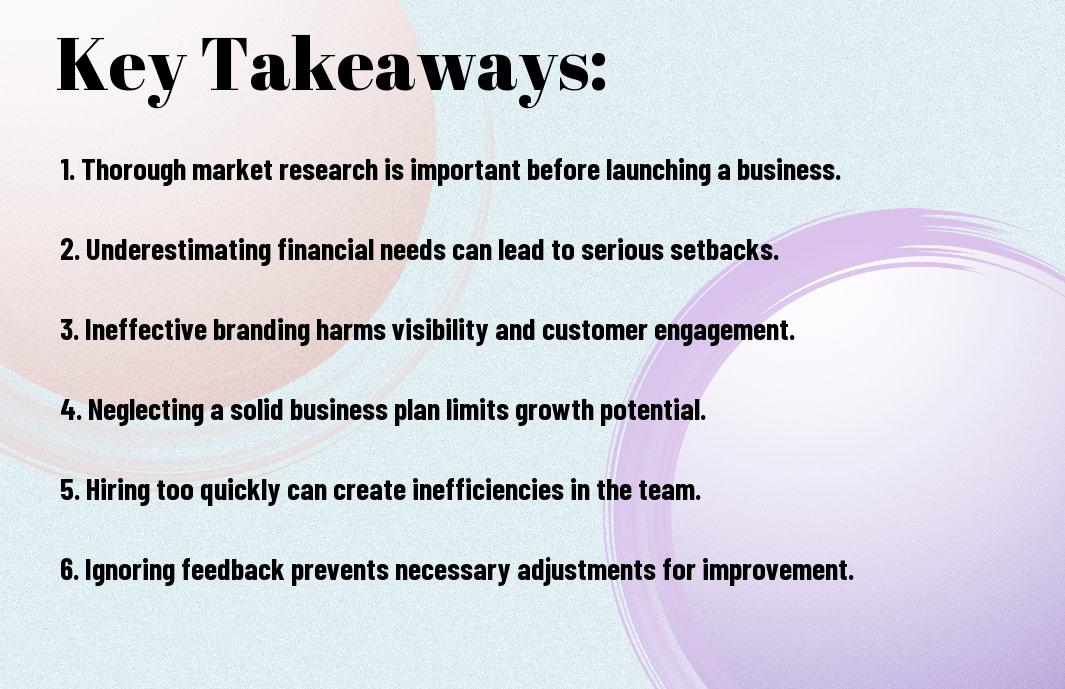There’s a pathway to entrepreneurship for those with limited funds. Starting a business on a budget may seem daunting, but with the right strategies and mindset, you can turn your ideas into reality. In this post, you will discover practical steps and innovative approaches that allow you to launch your venture without breaking the bank. From utilizing existing resources to leveraging digital platforms, you will learn how to maximize your impact and minimize your expenses in the early stages of your business journey.

Key Takeaways:
- Identify your niche: Focus on areas where you can offer unique value or solve a specific problem in the market.
- Bootstrap wisely: Start with minimal expenses by using personal savings or reinvesting early profits to sustain growth.
- Leverage free resources: Utilize online tools, social media, and community platforms to promote your business and connect with customers without spending heavily.
- Network strategically: Build relationships with other entrepreneurs, mentors, and potential customers to gain insights and support.
- Test your ideas: Start small with a pilot project or a minimum viable product (MVP) to gauge interest and gather feedback before scaling up.

Assessing Your Skills and Interests
To begin on your entrepreneurial journey, it’s important to assess your skills and interests. Understanding what you are passionate about and where your strengths lie can guide you in selecting a business model that not only aligns with your abilities but also keeps you motivated. Take the time to reflect on your experiences and areas of expertise, as these insights can help you define your niche and establish a strong foundation for your business venture.
Identifying Your Strengths
Below are some strategies to pinpoint your strengths: consider past achievements, gather feedback from peers, and evaluate your hobbies and interests. Make a list of skills you’ve developed through education, work experience, and personal projects. This exercise will clarify your capabilities and help direct your business choices, increasing your chances of success.
Researching Market Opportunities
Opportunities for your business can be discovered through thorough market research. Analyze industry trends, target demographics, and consumer behavior to identify gaps in the market that you could fill with your skills. Explore various platforms, like social media, online forums, or local community events, to gather insights into what potential customers want or need.
The right market research enables you to spot lucrative opportunities that resonate with your skills and interests. By identifying current trends and unmet demands, you can align your business idea with market expectations. Utilizing tools such as surveys, interviews, and competitor analysis, you can gain valuable insights to refine your offerings and increase your chances of success in a competitive landscape.
Developing a Business Idea
It is important to find a unique business idea that aligns with your passions and skill sets while considering market demand. Think about your interests, experiences, and the problems you encounter daily. This process will help you identify opportunities that not only inspire you but are also feasible in the marketplace.
Concept Development
To build a solid foundation for your business idea, focus on outlining the concept and identifying your target audience. Research various aspects of your business model, including products or services offered, pricing strategies, and potential revenue streams. This initial planning will guide you in creating a workable and tailored strategy.
Validating Your Idea
Idea validation is a key step in confirming the viability of your business concept. It involves gathering feedback from your target audience to ensure there is genuine interest in your product or service.
Consequently, use surveys, interviews, and social media engagement to gauge consumer reactions and gather insights. This stage is vital for understanding whether your idea addresses a real need and helps you refine your concept based on actual market demands. Engaging with potential customers early can save you time and resources by allowing you to pivot or enhance your idea before committing fully to your business launch.
Crafting a Business Plan
For anyone starting a business with limited capital, crafting a well-thought-out business plan is vital. This document not only guides your vision but also helps you identify potential challenges and opportunities. A clear business plan makes it easier to secure funding, attract partners, and track your progress over time. Taking the time to outline your goals, strategies, and market analysis will increase your chances of success in a competitive environment.
Essential Components of a Business Plan
Among the vital components of a business plan are an executive summary, market analysis, organizational structure, marketing strategy, and financial projections. The executive summary gives a snapshot of your business, while market analysis helps you understand your audience and competition. The organizational structure outlines your team, and the marketing strategy defines how you’ll promote your product or service. Finally, financial projections are vital for assessing the viability of your business.
Financial Projections with Limited Capital
For effective financial projections with limited capital, you need to focus on realistic budgeting and forecasting. Your projections should include startup costs, revenue estimates, and a break-even analysis. This straightforward approach allows you to map out financial expectations, even with constraints, making it easier to adjust your strategies as necessary.
Components of financial projections should include detailed income statements, cash flow statements, and balance sheets tailored to your specific limitations. You should emphasize conservative estimates to avoid overextending your resources. Documenting your expected revenues and expenses will provide a clearer financial picture and aid in decision-making. Consider utilizing low-cost marketing strategies and prioritizing vital expenses to maximize the effectiveness of your limited capital. This careful approach not only mitigates risk but also positions your business for sustainable growth.
Funding Your Business
Now that you have a solid business idea, it’s time to explore funding avenues that won’t break the bank. Consider creative strategies to acquire financial support, and don’t hesitate to investigate into resources like How To Start a Business With No Money in 2024 (5 Proven … to guide your efforts.
Exploring Low-Cost Funding Options
One effective approach is to investigate low-cost funding options such as crowdfunding, microloans, or grants tailored for startups. These alternatives can provide you with the needed capital without incurring hefty debts.
Leveraging Personal Resources
LowCost funding can also come from leveraging personal resources, such as savings or support from family and friends. These financial avenues often have fewer strings attached, giving you more flexibility in managing your business.
Funding your business through personal resources allows you to maintain control and potentially avoid high-interest loans. By tapping into your savings or asking trusted family members for financial support, you can kickstart your venture without the pressure of traditional financing. This approach not only helps you save on costs but also enables you to build your business at your own pace.
Building a Lean Startup
After you lay the groundwork for your business, adopting a lean startup approach is crucial for maximizing your limited resources. This method emphasizes efficiency and continuous learning, allowing you to adapt quickly. You can learn more about effective strategies by checking out 5 Ways to Grow Your Business with Limited Capital. This will equip you with valuable insights to navigate the challenges of starting your venture.
Minimizing Costs
After defining your business model, you should identify areas where you can cut costs without sacrificing quality. Evaluating your supply chain, leveraging technology, and negotiating with suppliers can lead to substantial savings. By streamlining operations and focusing on what truly matters, you can maximize your funds and ensure a healthier bottom line as you grow.
Focusing on MVP (Minimum Viable Product)
By prioritizing the development of a Minimum Viable Product (MVP), you can validate your business idea with minimal investment. This entails creating a basic version of your product that meets the core needs of your target audience. This approach allows you to gather feedback and make adjustments early on, significantly reducing the risk of costly mistakes and ensuring that your final offering aligns with market demands.
At this stage, concentrating on the MVP allows you to learn directly from your customers and enhance your product based on real feedback. An MVP provides insight into which features resonate the most, helping you save time and capital while fine-tuning your offering to better serve your audience. Moreover, this iterative process enables you to pivot quickly, fostering a more adaptable and responsive business model as you grow.
Marketing on a Budget
All successful businesses know the importance of marketing, but you don’t need a big budget to make an impact. Leveraging your creativity and resourcefulness can lead to effective marketing strategies that resonate with your target audience. Focus on building relationships, utilizing free tools, and tapping into local resources to reach potential customers without breaking the bank.
Cost-Effective Marketing Strategies
Below are several cost-effective marketing strategies that can help you promote your business. Networking within your community, attending local events, and engaging in partnerships with adjacent businesses can expand your reach. Additionally, utilizing email marketing and content creation, such as blogs and infographics, can establish your credibility while remaining budget-friendly.
Utilizing Social Media for Growth
On social media, you have the opportunity to connect with your audience and build a community around your brand. Platforms like Facebook, Instagram, and Twitter allow you to share valuable content, engage with customers, and promote your products at little to no cost. Consistent interaction can help foster loyalty and encourage word-of-mouth referrals.
Further, creating shareable content and engaging visuals enhances your visibility and allows your audience to promote your brand organically. By using analytics tools, you can track your performance and adjust your strategy to boost engagement further. Social media advertising can also be an affordable way to reach a larger audience, as you can set a budget based on your capacity and goals.
To wrap up
Considering all points, starting a business with limited capital is entirely achievable through careful planning and resourcefulness. You can begin by identifying your skills and leveraging them into a viable product or service. Utilizing free or low-cost tools for marketing, networking, and operations can significantly reduce expenses. Focus on building a solid business plan to guide your decisions and seek support from local resources or online communities. With dedication and strategic thinking, you can successfully launch and grow your business, even on a tight budget.
Q: What are the first steps to take when starting a business with limited capital?
A: Starting a business with limited capital begins with thorough planning. First, identify a niche that interests you and has demand in the market. Conduct market research to understand your potential customers and competitors. Next, create a detailed business plan that outlines your business model, services or products, marketing strategy, and financial projections. This plan will guide you through the initial stages and help you focus your limited resources effectively. Additionally, consider exploring low-cost or no-cost business structures, such as sole proprietorship or partnerships, which can help minimize initial expenses.
Q: How can I minimize startup costs when launching my business?
A: To minimize startup costs, consider bootstrapping, which involves using personal savings or small contributions from family and friends. Look into online resources and free tools that can assist with setting up your business, like website builders and accounting software. You can also consider working from home or sharing office space to reduce overhead costs. Additionally, focus on purchasing only important equipment and supplies initially, and adopt a lean inventory approach by offering products or services on demand. Networking with other entrepreneurs may also lead to bartering services, thus reducing cash outlay.
Q: What funding options should I consider if I need additional capital?
A: If you find that you need additional capital beyond your initial investment, there are several options to consider. Look into microloans, which are small loans designed for startups and small businesses. Crowdfunding platforms can also be useful, allowing you to raise small amounts of money from a large number of people. Additionally, seek out local or state grants specifically aimed at small businesses or startups, as they often provide financial support without the need for repayment. Another avenue is to approach angel investors or venture capitalists who might be interested in your business model or concept.



